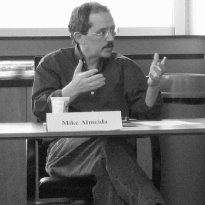 Jeppe Sinding Jensen is Associate Professor in the Department for the Study of Religion at Aarhus University. We invited him to answer the question “What norms or values define excellent philosophy of religion?” as part of our “Philosophers of Religion on Philosophy of Religion” series.
Jeppe Sinding Jensen is Associate Professor in the Department for the Study of Religion at Aarhus University. We invited him to answer the question “What norms or values define excellent philosophy of religion?” as part of our “Philosophers of Religion on Philosophy of Religion” series.
The question of “What Norms or Values Define Excellent Philosophy of Religion?” really is simple to answer. They cannot be anything other than the same norms and values that underwrite all other academic – philosophical and scientific – pursuits. What else, might we ask, if they are to be housed in the modern university? The problem for the philosophy of religion rather lies, as other blogposts indicate, in the distinction of the object of the ‘of’-relation. What is it that the philosophy of religion is a philosophy ‘of’? Norms and values display and relate degrees of rightness or wrongness in relation to human practices in accordance with given cultural and historically contingent social conventions. However, in the academic world, certain universal and transcendent conditions rule: truth, rightness and honesty must reign. Here, the least one can do is to secure an appropriate coverage of terminology. Thus, the crucial point is what is meant by ‘religion’ – as the meaning of ‘philosophy’ must follow the general usage in and of the modern university. Unfortunately, for the clarity of the discussion, ‘religion’ is a term that covers a fuzzy, if not outright messy, set of concepts. The philosophy of religion, if there is to be one such, must then necessarily follow the usages and insights from the study of religion, studies of religion that must, it should be pointed out, remain and rely on the same epistemic levels and with the same ontological commitments as philosophy in general.
‘What is religion?’ becomes the principal question, then. The many aspects of what we habitually cover by the concept of religion would preclude any stable treatment of the issue. The philosophy of ‘religion’ would necessarily dissolve into philosophies of sociality, semantics, beliefs, emotions, behavior, power, politics and the many other things that may be included in any religious tradition. Looking towards established philosophy of religion, we have been accustomed to what Mark Gardiner recently noted as philosophical reflections on ‘a particular type of belief system, namely Eurocentric abstract monotheism.’ I agree with Gardiner, that with ‘belief’ as the privileged core, the philosophy of religion has been narrow and skewed. Granted, there is a problem (or more) with the rationality of religious belief in the modern world, but that certainly is not the only – nor need it be the dominant – question for a responsible philosophy of religion. Imagine, what would the subject matters be of a hypothetical philosophy of TV? If it focused narrowly on advertising income, or on news presenter hairstyles, important as they may be in some places, we would instantly recognize the missing bits and pieces. Thus, to be brief, I must admit that I can see no other avenue for the philosophy of religion than to develop a broader conception of its own role in the modern university. Just as philosophers of, say, language have the work of linguists and other scholars / scientists as setting the boundary condition for their philosophy of language, so philosophy of religion should be congruent with the study of religion in its fundamental assumptions. This would mean listening to what goes on in the study of religion. However, not everything that goes on in the study of religion need be equally important, or even worth contemplating for philosophers, but many things will be worthy of attention. Here, it is equally notable how the study of religion seems to thrive in the university without serious engagement with philosophical questions. If, and when, practitioners of the study of religion may seem to neglect or disregard philosophical issues and tasks, it may also be because the impressions they get of what philosophy is and does have come from conventional philosophies of religion that appear parochial and one-sided. Contemporary studies of religion stress many aspects other than those relating to truth-issues in religious discourse. Such aspects are the emotional, behavioral, ritual, institutional – to name but some. It follows that the philosophy of religion should be oriented towards those same aspects and be able to assist the scholarly community in clarifying and explaining what philosophical engagements with religion and the study of ‘it’ may contribute to our understanding of these aspects of the human condition. This is what we should and could do. As can be seen from the number of subjunctives here, this little piece is a contribution to a normative discussion, true, but please note that it is a contribution to a discussion of methodological normativity. Thus, the philosophy of religion should not be a contribution to religion, but to philosophy on the one hand and to an understanding of religion on the other. Consequently, the register of normativity must shift from the moral-existential (or outright religious) to the methodological. The first requirement, then, is the distinction of what the philosophy of religion is a philosophy of. If its object is that which we call ‘religion’, then the philosophy of religion would need to heed what goes on in the humanities, in the social and the life sciences in due proportions and take its course according to its current object of reflection or investigation. The philosophy of religion must be nested within philosophies of other and ‘greater’ matters, just like an imagined ‘philosophy of ornithology’ would be embedded in a philosophy of biology in general.



